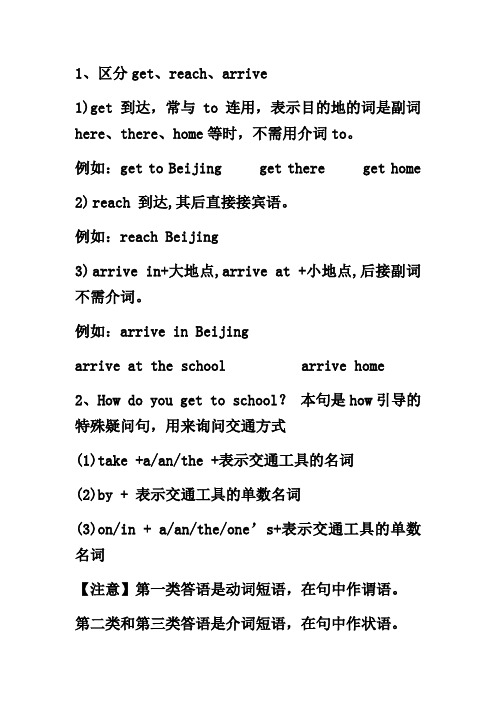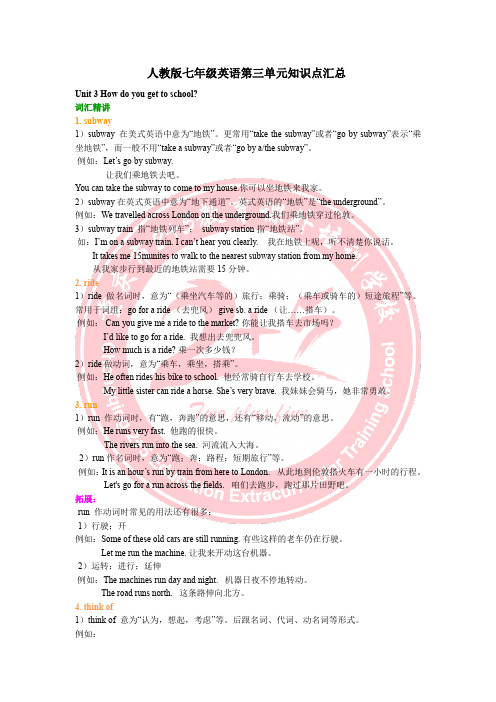英语七年级下册第三单元知识点
人教版七年级下册英语Unit 3 知识点语法归纳总结

人教版七年级下册英语Unit 3 知识点语法归纳总结Unit 3 How do you get to school?In this unit。
we will learn how to talk about n and how to describe our daily commute to school.1.Phrases to remember:Get to school: Arrive at schoolTake the subway: Use the subway as nRide a bike: Use a bicycle as nHow far: The distance een two placesFrom home to school: The distance een home and schoolEvery day: DailyTake the bus: Use the bus as nLeave Beijing for Shanghai: Depart from Beijing to Shanghaieful sentences:How do you get to school。
I ride my bike to school.How far is it from your home to school?How long does it take you to get to school?For many students。
it is easy to get to school.age:1) How to express n:How do you get to school?When describing n。
we usually use ns such as "by" (without "a/the").BusThink ofeen。
七年级下册英语知识点总结unit3

七年级下册英语知识点总结unit3 Unit 3是七年级下册英语中的重要章节,包括了关于“Where did you go on vacation?”话题的语言知识学习。
本文将总结这一单元中的主要知识点,帮助同学们学习和复习英语知识。
一、动词过去式在本单元中,我们学习了动词过去式的构成。
对于一般动词,加ed,如“ visit-visited”, “stay-stayed”,“rent-rented”等。
irregular verbs(不规则动词)不遵循这个规则,要在记忆时重点记忆这些例外动词的变形。
如“go-went”,“eat-ate”,“see-saw”等。
二、特殊疑问句的构造特殊疑问句也是本单元中的重点,我们学习了如何使用特殊疑问句来询问別人的去向。
特殊疑问句可以通过疑问词(如what, where, when, how)的询问构成,如 "Where did you go on vacation?", "When did you visit your grandparents?"等。
三、介词 at, in, on的区别和用法本单元中,我们也学习了介词at, in 和 on的区别和用法。
其中的细节是很重要的,因为这些介词的用法在表达时间和地点上是非常频繁的。
简单总结下,at 用于特定的时间点,如“at 9o'clock”,“at Christmas”, “at the party”, on 用于特定的日期或日子,例如“on Monday”,“on December 25th”,“on the weekend”, in 用于一段时间内,如“in June”,“in the afternoon”,“in summer”,“in 2019”。
四、冠词的使用本单元中我们也学习了冠词的用法。
不定冠词“a”和“an”用于表示单数可数名词,而定冠词“the”在特定情境下指特定的名词。
七年级下册英语第三单元知识总结

七年级下册英语第三单元知识总结Unit 3 of the seventh grade English textbook covers a variety of topics including daily routines, time, and prepositions of time. In this unit, students learn how to talk about their daily activities, express the time in English, and use prepositions of time correctly. Let's summarize the key points of this unit.1. Daily RoutinesOne of the main focuses of this unit is on daily routines. Students learn how to talk about their daily activities using simple present tense verbs. For example, they practice saying sentences like "I wake up at 7 o'clock", "I brush my teeth after breakfast", and "I go to bed at 10 o'clock".2. Time ExpressionsAnother important aspect of this unit is learning how to express time in English. Students learn how to tell the time using both the 12-hour and 24-hour clock systems. They also practice using time expressions such as "in the morning", "at noon", "in the evening", and "at night".3. Prepositions of TimeIn this unit, students also learn how to use prepositions of time correctly in sentences. They practice using prepositions such as "at", "in", and "on" to talk about specific times, durations, and days. For example, they learn to say "I have English class at 9 o'clock", "I go to bed in the evening", and "I have a test on Monday".4. Vocabulary BuildingThroughout the unit, students are introduced to new vocabulary related to daily routines, time, and prepositions. They learn words such as "alarm clock", "shower", "have breakfast", "busy", "weekend", "next week", and "last month".5. Grammar PracticeTo practice the new vocabulary and grammar structures, students are given exercises and activities to complete. These include filling in the blanks with the correct prepositions of time, matching time expressions with daily activities, and creating sentences using the correct tense and time expression.6. Speaking and Writing ActivitiesAt the end of the unit, students are encouraged to practice speaking and writing about their daily routines, time schedules, and activities. They can work in pairs or groups to haveconversations about their daily routines or write a short paragraph describing a typical day in their life.Overall, Unit 3 of the seventh grade English textbook is an important unit for students to learn how to talk about their daily activities, express time in English, and use prepositions of time correctly. By mastering the key points covered in this unit, students will be able to communicate effectively about their daily routines and time schedules in English.。
人教七年级下册英语第三单元知识点

1、区分get、reach、arrive1)get 到达,常与to连用,表示目的地的词是副词here、there、home等时,不需用介词to。
例如:get to Beijing get there get home 2)reach 到达,其后直接接宾语。
例如:reach Beijing3)arrive in+大地点,arrive at +小地点,后接副词不需介词。
例如:arrive in Beijingarrive at the school arrive home2、How do you get to school?本句是how引导的特殊疑问句,用来询问交通方式(1)take +a/an/the +表示交通工具的名词(2)by + 表示交通工具的单数名词(3)on/in + a/an/the/one’s+表示交通工具的单数名词【注意】第一类答语是动词短语,在句中作谓语。
第二类和第三类答语是介词短语,在句中作状语。
by + 表示交通工具的单数名词时,名词前不能加冠词等修饰语。
(4)walk/ride/drive/fly+to+地点名词步行/骑自行车/开车/坐飞机去某地例如:1)I walk to school.=I get to school on foot.2)I ride my bike to school.=I get to school bybike.=I get to school on my bike.3)I take the bus to school.=I get to school bybus=I get to school on the bus.4)drive a car to work=go to work by car=go to workin a car5)fly to shanghai=go to shanghai byplane/air=take the/a plane to shanghai=go to shanghai on a/an/the plane.3、hundred数词,“一百”,当hundred前面有基数词修饰,表示确切数字时,hundred要用单数;当hundred前面没有基数词修饰,表示不确切数字时,要用hundreds of,意为“数百的,成百上千的”。
七年级下册英语第三单元知识点汇总

人教版七年级英语第三单元知识点汇总Unit3 How do you get to school?词汇精讲1. subway1)subway 在美式英语中意为“地铁”。
更常用“take the subway”或者“go by subway”表示“乘坐地铁”,而一般不用“take a subway”或者“go by a/the subway”。
例如:Let’s go by subway.让我们乘地铁去吧。
You can take the subway to come to my house.你可以坐地铁来我家。
2)subway在英式英语中意为“地下通道”。
英式英语的“地铁”是“the underground”。
例如:We travelled across London on the underground.我们乘地铁穿过伦敦。
3)subway train 指“地铁列车”;subway station指“地铁站”。
如:I’m on a subway train.I can’t hear you clearly. 我在地铁上呢,听不清楚你说话。
It takes me 15munites to walk to the nearest subway station from my home.从我家步行到最近的地铁站需要15分钟。
2. ride1)ride 做名词时,意为“(乘坐汽车等的)旅行;乘骑;(乘车或骑车的)短途旅程”等。
常用于词组:go for a ride(去兜风)give sb. a ride(让……搭车)。
例如:Can you give me a ride to the market?你能让我搭车去市场吗?I’d like to go for a ride. 我想出去兜兜风。
How much is a ride?乘一次多少钱?2)ride做动词,意为“乘车,乘坐,搭乘”。
例如:He often rides his bike to school. 他经常骑自行车去学校。
七年级下册英语第3单元知识点总结

七年级下册英语第3单元知识点总结
以下是七年级下册英语第3单元的部分知识点总结:
1. 重点词汇:学会使用描述人物的形容词,例如heavy、thin、pretty、handsome等。
2. 重点句型:学会使用感叹句来表达对人物的看法,例如“What a beautiful girl she is!”
3. 语法重点:掌握形容词的用法,了解形容词在句子中的位置和作用。
4. 日常交际用语:学会在日常生活中使用描述人物的语句,例如“You look great today!”
综上所述,七年级下册英语第3单元主要涉及描述人物的词汇、句型、语法和日常交际用语。
通过本单元的学习,学生将能够更好地理解和使用英语描述人物特征和外貌。
建议学生多加练习,以提高英语口语和写作能力。
七年级下册英语第三单元知识点
七年级下册英语第三单元知识点一、单元目标与概述本单元旨在帮助学生掌握基本的英语语法结构,提高阅读理解能力,并能够运用所学知识进行日常交流。
通过本单元的学习,学生将能够描述日常生活中的活动,使用一般现在时和一般过去时态,以及了解和运用基本的英语词汇和表达方式。
二、语法重点1. 一般现在时(Simple Present Tense)- 描述习惯性动作、日常活动、普遍真理和状态。
- 构成:主语 + base form of verb (for most verbs) / third form (for some verbs)- 例句:She often reads books in the library.2. 一般过去时(Simple Past Tense)- 描述过去某一确定时间发生的动作或事件。
- 构成:主语 + past form of verb (regular verbs: base form + -ed; irregular verbs: different forms)- 例句:He walked to school yesterday.3. 可数名词与不可数名词- 可数名词:可以用数字计数的名词,有单数和复数形式。
- 不可数名词:不能用数字直接计数的名词,通常是抽象概念或物质。
- 例句:I have two books. (可数) / Water is important for our health. (不可数)4. 形容词的比较级和最高级形式- 比较级:用于比较两者之间的差异。
- 最高级:用于比较三者或三者以上的差异。
- 例句:She is taller than her brother. / Tom runs the fastest in his class.三、词汇与短语1. 常见动词- eat, drink, play, study, work, read, write, listen,speak2. 描述日常活动的短语- do homework, watch TV, clean the room, take a shower, go shopping3. 描述过去事件的短语- went to the park, visited my grandparents, played soccer4. 形容词比较级和最高级形式- bigger/bigger/(biggest), happier/happier/(happiest),more interesting/more interesting/(most interesting)四、阅读理解通过阅读短文或对话,学生应能够理解文章的主旨大意,提取关键信息,并能够回答关于文章内容的问题。
七年级第三单元英语知识点汇总
七年级第三单元英语知识点汇总七年级第三单元英语知识点是初中英语学习中的重点内容之一,其涉及到英语语法、词汇、口语表达和阅读理解等方面。
本文将对该单元的重要知识点进行汇总,以便大家更好地备考和学习。
一、重要词汇1. 数词(Numeral)数词在英语语言中比较重要,其代表了具体的数字,可以用来表示数量或者顺序,且可变形式很多。
常用的数词有:one, two, three, four, five, six, seven, eight, nine, ten, eleven, twelve, thirteen, fourteen, fifteen, sixteen, seventeen, eighteen, nineteen, twenty, thirty, forty, fifty, sixty, seventy, eighty, ninety, hundred, thousand。
2. 形容词(Adjective)形容词是修饰名词或代词的词语,描述名词或代词的某些特征或性质。
常见的形容词有:happy, sad, beautiful, ugly, big, small, tall, short, thin, fat。
3. 副词(Adverb)副词是修饰形容词、动词、其他副词或句子的词语,表达的是时间、地点、方式、原因、程度等方面的信息。
常用的副词有:often, always, never, sometimes, here, there, now, then, quickly, slowly, loudly, softly。
二、重要语法1. 句子构成英语句子的基本构成是主语+谓语(动词)+宾语,其中主语和宾语可以是名词、代词、数词等。
例如:My mother bought an apple yesterday.(我的妈妈昨天买了一个苹果。
)其中,“My mother”为主语,“bought”为谓语动词,“an apple”为宾语。
七年级下册英语第三单元知识点归纳
七年级下册英语第三单元知识点归纳如下:核心词汇:1. 野生动物:wild animals2. 野生动物保护区:wildlife reserve3. 濒危:endangered4. 猎杀:hunt5. 允许:allow6. 禁止:forbid7. 旅游者:tourist8. 野餐:picnic9. 环保组织:environmental protection organization词组:1. 对……有益处:be good for2. 被发现:be discovered by3. 自然保护区:nature reserve4. 野餐区:picnic spot5. 野生动物救护中心:wildlife rescue center重点句子:1. It is important to protect endangered animals and plants. 保护濒危动植物是重要的。
2. Many wild animals are now living in wildlife reserves. 现在许多野生动物住在野生动物保护区。
3. We should not hunt wild animals or cut down trees in the forest. 我们不应该猎杀野生动物,也不应该在森林里砍伐树木。
4. I hope my country will take more actions to protect the environment and endangered animals and plants. 我希望我的国家会采取更多行动来保护环境和濒危动植物。
5. Let’s go for a picnic and do something we can to protect our environment and wild animals and plants! 我们去野餐,做一些我们能保护我们的环境和野生动物和植物的事情吧!单元主题: 本单元主要介绍了保护野生动物的重要性以及相关政策法规,涉及猎杀、狩猎、捕捉等非法行为,呼吁人们关注环保、保护濒危动物,共同营造一个和谐美好的生态环境。
七年级下册英语unit3知识点思维导图
七年级下册英语unit3知识点思维导图随着教育的发展,学生对知识点的掌握越来越重要。
在学习英语的过程中,学生需要掌握一些基础知识,才能更好的理解、应用和巩固英语知识。
本文将会为大家介绍七年级下册英语Unit3知识点思维导图,希望对大家的英语学习有所帮助。
一、陈述句1. 陈述句的定义陈述句是指陈述某种事实、观点、感受、意愿或者道理等的句子。
2. 陈述句语序陈述句的语序为主语+谓语+其他,谓语通常为动词,其他可以是宾语、宾语补足语、状语等。
3. 陈述句的变法英语中,陈述句有肯定句和否定句之分,需要掌握不同的语法规则。
二、系动词1. 系动词的定义系动词是指连接主语和主语补足语的动词,用来表示主语的状态或特点。
2. 常见的系动词be、look、smell、sound、taste、feel等。
3. 系动词的用法系动词通常用在表示状态的句子中,如She is happy.;同时也可以用在表示特点的句子中,如The book looks interesting.。
三、名词1. 名词的定义名词是指用来表示人、事、物、地点等概念的词语。
2. 名词的分类名词可以根据不同的分类标准进行分类,如可数名词和不可数名词、单数和复数等。
3. 名词的用法名词通常用在句子中作为主语、宾语、表语、定语等,需要根据不同的语法规则进行使用。
四、形容词1. 形容词的定义形容词是指用来描述人、事、物的性质、状态、特点等的词语。
2. 形容词的比较级和最高级形容词有比较级和最高级之分,用来表示不同程度的程度差异。
3. 形容词的用法形容词通常用在句子中作为定语、表语、宾语补足语等。
五、副词1. 副词的定义副词是指用来修饰动词、形容词、其他副词或者整个句子的词语。
2. 副词的用法副词的使用需要注意与其他词语的搭配,同时也需要注意副词的比较级和最高级形式。
3. 常见的副词often、usually、sometimes、never等。
六、冠词1. 冠词的定义冠词是指用来限定名词的词语,分为定冠词和不定冠词。
